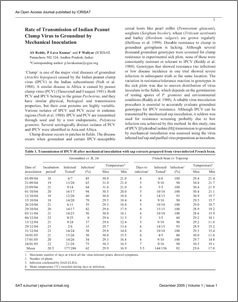Rate of Transmission of Indian Peanut Clump Virus to Groundnut by Mechanical Inoculation
Abstract
The rate of the Indian peanut clump virus (IPCV; Hyderabad isolate) transmission to groundnut by mechanical inoculation was assessed using virus-infected leaf sap and purified virus preparations as inoculum. French bean (Phaseolus vulgaris cv. Topcrop) and groundnut cv. JL 24 were used for inoculation. Leaves were dusted with newly extracted inoculum, and then maintained in greenhouse chambers at 27-35°C. IPCV-H-infected groundnut seed stored at -70°C was used as initial virus inoculum source. Seed material (1:10 w/v) was macerated in chilled inoculum buffer and immediately inoculated to French bean. Veinal necrosis symptoms, typical of IPCV infection, developed at 4-7 days after infection. This was used as the virus source for subsequent experiments. Leaf sap extract (1:10 w/v) prepared from IPCV-H infected French bean was inoculated to 16 batches of French bean and groundnut plants raised in growth chambers from September 2004 to January 2005. French bean plants were readily infected with the virus in all these experiments. Infected plants showed typical symptoms within 5-7 days after infection. Except on one occasion, 80-100% of the inoculated plants were infected with the virus. Using French bean as inoculum source, IPCV-H could be efficiently transmitted to groundnut by mechanical sap inoculation and the virus has approximately 3 weeks of incubation in groundnut. This method is convenient and allows reliable screening of elite groundnut germplasm for resistance to various IPCV and PCV isolates in a relatively short period

